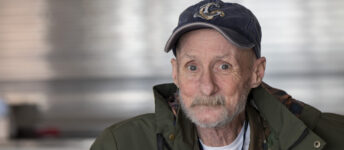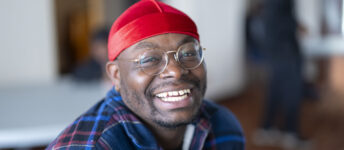Shannon
“What’s Not to Like About This Place?”
How your support of the Mission helped Shannon land back on his feet.
“I wasn’t doing the right thing,” Shannon admits. “I was different back then. Looking back now, I must have been insane!”
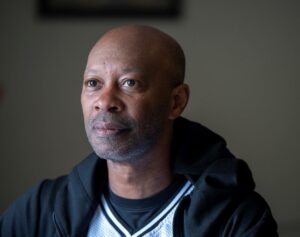
Shannon doesn’t like talking about his life in his late teens and early 20s. “I’ve left that behind, moved on.” When pressed, the quiet 51-year-old shares a little more: “It wasn’t drugs,” he offers. “But I didn’t want to end up like other some people that were doing the same thing I was doing at the time. I didn’t want to become another statistic.”
He acknowledges that having his first child, a son, at 20 became a strong motivation to change his life. He realized, “I can’t keep doing this…. It was time for me to get a real job, put it that way, to see what that part of life was all about.”
“I had an opportunity to get away from that environment,” Shannon says. “I wanted to try to maintain a better lifestyle.”
And so he did both. At 26, Shannon moved from Hampton Roads to South Florida, where his mother was living. Over the next 20-some years, he had steady work, mostly as a certified forklift operator in warehouses. He was married for a while, and raised his daughter until she became a teen. Things weren’t perfect, he says, but “I was doing a lot better in life.”
In 2019, Shannon wanted to be closer to his family in Maryland and Virginia, including his first grandchildren, so he returned home to Tidewater. At first, all was going well. But in late 2020 he slipped and fell on some icy steps, hitting his head several times on the way down.
Shannon doesn’t remember exactly how many steps there were, “but apparently I hit all of them.”
He says you could see his brain where the back of his skull was split open. “I can show you the scar, if you want to see it. It was really, really bad.”
The hospital kept him in a medically induced coma for weeks to reduce the swelling in his head. When he awakened, Shannon found he was left with a traumatic brain injury, nerve damage, and back pain. The physical therapist helped him relearn how to walk and deal with an ongoing unsteady gait. “My doctor told me I was ‘lucky,’” but Shannon knows his survival was miraculous.
“Only one thing kept me alive from this.”
Shannon lived with his father for a while after the accident. He was able to find warehouse jobs doing inventory and stocking, but as an aftereffect of the accident, Shannon began having seizures that kept him from working steadily.
“My seizures are weird. I lean to the right a little, but I’m totally aware of my surroundings. I still have the headache and convulsions and muscle spasms, but I can be having a normal conversation. My thoughts are completely coherent. Yeah, it’s really weird.”
The chronic seizures made staying with his father more and more untenable, but he could not afford to live alone. Facing homelessness, Shannon wasn’t sure where he’d turn.
Then he remembered riding by The Union Mission one day, and immediately did an online search. What he learned felt almost like an invitation, a warm welcome from his worries. “It seemed like a nice place,” he says. “And I’ve been here ever since.”
Very quickly it became clear that Shannon’s health needed to be the top priority.
“My first night here at the Mission I had three seizures back to back. It was ridiculous!”
Once he returned from the latest hospital stay, the Mission’s Wellness Team worked with the Sentara Healthcare Community Care Center onsite to update Shannon’s diagnoses and get him on the right medications to stop those episodes. “Just one pill every 12 hours,” Shannon says, “and I haven’t had a seizure since.”
As with all guests, the Mission provided Shannon with shelter, meals, compassionate care, and other helpful resources. Every time his Case Manager recommended a class, Shannon participated. He learned a lot in the Glascow Health courses and group discussions on overcoming traumas and attended chaplain-led art therapy sessions. Sentara’s Optima HEAL Program helped him take better care of his physical health.
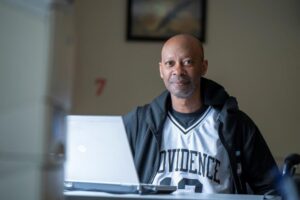 After about a year in our emergency shelter dormitories, Shannon qualified for the Mission’s transitional program pipeline. He was able to move into his own room on the second floor of the Bashford Men’s Shelter, for which he pays a very reasonably priced monthly program fee.
After about a year in our emergency shelter dormitories, Shannon qualified for the Mission’s transitional program pipeline. He was able to move into his own room on the second floor of the Bashford Men’s Shelter, for which he pays a very reasonably priced monthly program fee.
His Case Manager and a Legal Aid representative helped him reapply for Social Security Disability Insurance, which finally was approved late in May. Soon Shannon will receive a steady, if modest, income from SSDI.
And once his SSDI back payments arrive, Shannon will be one step closer to getting his own place. He’s applied with the Norfolk Housing and Redevelopment Authority and is on the verge of qualifying for a rent-subsidized apartment for low-income residents in Norfolk. “I’m really looking forward to being part of this program.”
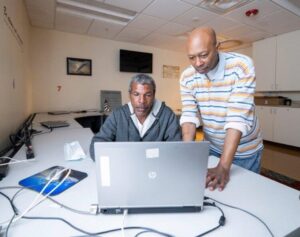 The Mission also gave Shannon a job in the shelter’s computer lab, showing other homeless guests how to do the same things he’s had to do himself. He helps the men with vital online tasks like applying for jobs, housing, benefits, health insurance, and more. “When they come in, they tell me what they’re trying to do, and I help them do it,” Shannon says. “They say, ‘I’m trying to get my birth certificate,’ or an ID or a Social Security card, things like that. I just assist them with that.”
The Mission also gave Shannon a job in the shelter’s computer lab, showing other homeless guests how to do the same things he’s had to do himself. He helps the men with vital online tasks like applying for jobs, housing, benefits, health insurance, and more. “When they come in, they tell me what they’re trying to do, and I help them do it,” Shannon says. “They say, ‘I’m trying to get my birth certificate,’ or an ID or a Social Security card, things like that. I just assist them with that.”
He started out as a volunteer — “I didn’t mind helping out. I feel like I owe the Mission for all they’ve done for me.” — but Shannon is thankful that it’s developed into a part-time job. He’s finally getting paid to use skills he learned from earning his certificate in Computer Information Technology years before his accident. Shannon loves his work with the guests.
“I plan on continuing to keep doing what I do in the computer room. I’m committed to the Mission. Put it that way.”
“What’s not to like about this place?” Shannon asks. “They’ve given me a room. They’ve given me a job. And they’ve given me a different outlook on things.”
That new viewpoint includes rediscovering the faith of his youth. Shannon remembers going to church with his grandparents in Portsmouth as a child, but had drifted away from it over the years. He appreciates the spiritual dimension of the Mission’s programs like chapels, worship services, and the Bible-centered workshops Forgiveness 101 and Manhood Unleashed. He says it all fits into God’s great plan.
“If it wasn’t for God, I wouldn’t be here….There’s no shame in having stayed here at the Mission. This is just the beginning!”
“I’m good here,” he says. “I’m not hurting for anything. The Union Mission provides me with everything I need. They’ve done so much for me…more than what some of my family has,” he says.
Shannon says he’s happy to be on track “to get my life back to normal.” Once he finds an affordable apartment, he plans to continue to focusing on improving his health. He doesn’t mind that he’ll remain on medication — “I never want to have another seizure, ever!” – or that he’ll still use a cane to steady himself. He has plans to build a brighter future.
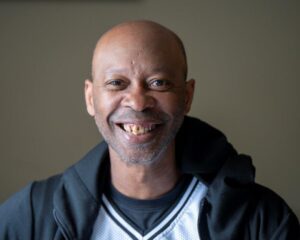 He hopes to be able to save and invest some of his SSDI check once it arrives, though he “definitely” wants to get another car, something he hasn’t had since 2019. And Shannon smiles at the prospect of visiting his mother in Baltimore for the first time in three years. If his son and his two grandkids want to come along, that would be even better, he says.
He hopes to be able to save and invest some of his SSDI check once it arrives, though he “definitely” wants to get another car, something he hasn’t had since 2019. And Shannon smiles at the prospect of visiting his mother in Baltimore for the first time in three years. If his son and his two grandkids want to come along, that would be even better, he says.
Shannon says that if it weren’t for the support of compassionate friends like you, he doesn’t know how things might have ended up. But thanks to your kindness and generosity, the Mission has helped Shannon get back on his feet and find hope for his future.
— Cheryl Little with Mark Moring for The Union Mission

